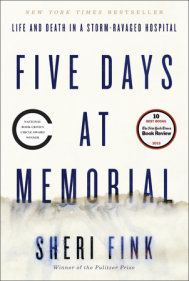Published by Crown Publishing ISBN 978-0-307-71896-9
Hardcover, $27, 448 pages
A good narrative non-fiction can be as satisfying and gripping as a novel. An example of a recent one is Rebecca Skloot's The Immortal Life of Henrietta Lack, which has spent over two years on the best seller. Skloot brilliantly tells the tale of a poor black woman from Baltimore, Lacks, whose cancer cells were harvested and used in many medical breakthroughs in the last half of the 20th century.
Although Lacks contribution to medical science saved countless lives, her family didn't give permission for their use and received no monetary compensation. Skloot shows the reader that many of her descendents could not even afford health insurance and had many medical issues of their own because they lacked adequate health care.
Like Skloot, Fink takes on a story with moral and ethical overtones- what killed 45 patients at Memorial Hospital in New Orleans in the days following Hurricane Katrina, in her incredibly fascinating Five Days at Memorial. Fink interviewed dozens of people who were there- doctors, nurses, aides, family members, patients, hospital administrators, rescuers, police investigators, coroners and more to tell her gripping story.
Fink drops the reader right into the hospital during the hurricane and in the horrific aftermath of the storm, when the levees failed and the hospital was completely surrounded by floodwaters. The reader feels the rising panic as generators fail, toilets stop working, medicines run low, cell phones die and communication is lost with the outside world.
Close to 200 people were evacuated from the hospital by helicopter and boats, but 45 patients died, most of them either terminally or gravely ill, the most of any hospital in the city. And most of them died of an overdose of morphine and Versed, allegedly by the hands of Dr. Anna Poe, a surgeon at the hospital. She and two nurses were arrested for killing those patients after a lengthy investigation.
Fink methodically lays out what went on at the hospital during those days. The corporate owner of the hospital, TenetCare, had an emergency plan that lacked some key elements. After 9/11, hospitals had to beef up emergency plans.
"The doctors at Memorial had drilled for disasters, but for scenarios like a Sarin gas attack, modeled that April, where multiple patients arrived at the hospital at once. Not in all his years of practice had Thiele drilled for the loss of backup power, running water, and transportation."They had no contract with helicopter companies to evacuate the hospital (as other hospitals did) during a flood in a city where hurricanes and floods can be devastating. The person left in charge in the home office of Houston had no disaster experience or training, and the lack of communication with the hospital during the crisis was unconscionable.
The staff at Memorial felt they had been abandoned by their owners, as well as by their government. There seemed to be no one in charge at a local, state or federal level who could give them information as to when and how they would evacuate. All they heard were rumors of rampant looting, and the gunfire they could hear in the neighborhood made them fear they would be overrun by criminals looking for drugs.
When the evacuations begin, with boats commandeered by an older couple looking for a family member, and helicopters fly in, the triage that took place was the opposite of most; instead of the sickest going first, the healthiest patients were evacuated first. That decision had repercussions that had to be answered for later.
The first half of the book will have you on the edge of your seat, and the people who stayed behind to help the patients were heroic in their efforts. Fink sketches them with deserved empathy and compassion. As you read, you may ask yourself, "could I have done that?"
The second half of the book deals with the efforts by investigators and the state attorney general, who was looking to make a name for himself, to bring murder charges against the three women. Most of the general public did not feel this was warranted, and support for the women was strong.
But there were people, including doctors from Memorial, who were appalled at what happened and wanted to see justice for the people who died. They felt that these women violated their oath to do no harm and took matters into their own hands.
The one overriding theme of Five Days at Memorial is that governments and healthcare facilities must have effective disaster planning. There were so many failures on the part of government and corporations that allowed this to happen when it did not have to happen.
You may think you know how you feel about this situation, but Fink skillfully shows you all sides, and you will most likely come away from this book with more questions than answers as I did. This is a must-read book.
rating 5 of 5



Ever since both you and Swapna raved about this book, I've wanted to read it. I hope I get to it soon.
ReplyDeleteI remember hearing you talk about this book at BEA - glad it lived up to expectations. It sounds like an interesting story and the comparison to Skloot has me convinced - I though that book was excellent!
ReplyDelete